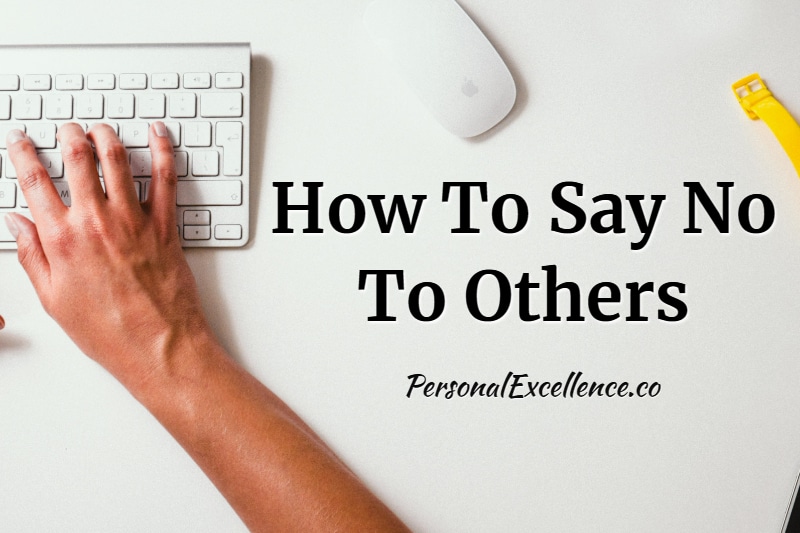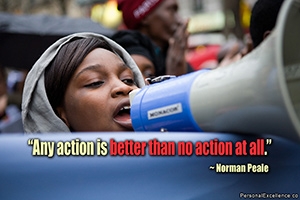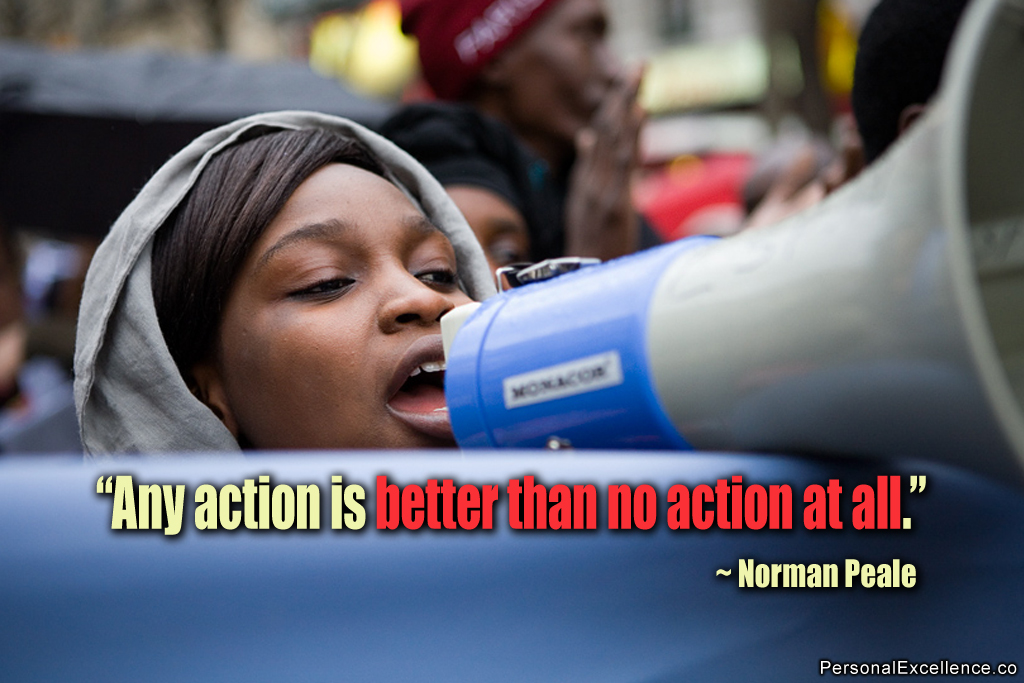
Do you have problems saying no?
I used to be really bad at saying no. Part of it was because I didn’t like to leave people in the lurch. Another part was because I didn’t want to disappoint others. There was also a part of me that felt that saying no would mean burning bridges with others (part of my Chinese upbringing), and I didn’t want to jeopardize my relationships with others.
Hence I would say yes whenever I could, to avoid saying no.
Reality of Saying Yes
While saying yes may seem like an easy way out — to avoid saying no, to avoid unpleasantries — it’s a terrible solution in reality.
Because while it provides quick short-term relief (such as avoiding confrontation with others and dealing with uncomfortable emotions), saying yes has its own long-term implications. Because every time we say yes to something, we say no to our own priorities. Think about it:
- Every time you say yes to the things you don’t really enjoy, you say no to the things you do enjoy.
- Every time you say yes to things you’re not really keen on, you say no to the goals you could be working on.
- Every time you say yes to meetups that often go nowhere, you say no to time with the people you really care about.
- And every time you say yes to yet another favor, you say no to the things that are the most important to you.
So when I first started my business, I said yes to almost everything. Meetups, networking sessions, meetings to pick my brain, favors, collaborations, blog interviews, media interviews, workshops, etc. — it was a yes, yes, and yes all the way.
This worked well for the first few years. But as my business grew and I became more established in the field, I found myself with more requests than I could deal with. I also regularly received requests for things that I didn’t really care about, from people who were persistent in getting my time, which would move their agenda to the top of my to-do list.
After a while my days became filled with what others wanted from me. I was constantly busy meeting people and helping them in things they wanted to do, but not nudging forward in the things I wanted to do. I found myself busy doing interviews, answering emails for help, collaborating with others as a favor, agreeing to sessions to pick my brain, and giving advice to everyone, with no time for my own projects.
Soon, I became burnt out. My time was no longer my own — it was taken over by what others wanted from me. I became deeply unhappy and miserable as the list of requests from others kept growing, and I just didn’t have space for myself and what I wanted to do.
This was when I realized the importance of saying no.
Why Saying No is Important
In an ideal world, we want to say yes to everyone. But saying “yes” just to avoid conflict or disagreement isn’t the way to go. Saying no is necessary to…
- Get things done. The reality is that all of us have limited hours a day. Unless we say no to the other things, we’ll never have time to get things done.
- Have time for the important tasks. There is a category of goals that are highly important but will never become urgent, called the Quadrant 2 goals. They include finding your purpose, setting your five-year vision, working on your passion, and even starting your business. Saying no is about protecting your Q2 goals and ensuring that you have time for them.
- Set boundaries for yourself. Some people assume that you are free all the time, that their requests are the most important, or that you should make time out for them and them only. But that’s not true. When you don’t reject others and set boundaries, people will keep assuming that you should give by default. Saying no is about setting boundaries and protecting yourself from others.
- Regain control of your life. Lastly, saying no is about regaining control of your life and your schedule. To reject anything that doesn’t suit your goals and doesn’t make you happy so that you can create the life that you do want.
At the end of the day, every “yes” comes with its costs — your time, energy, happiness, and goals. While the cost may be small for each “yes,” little trickles of wrong yes’s over long will deviate you from where you want to be.
To push away all these costs, these deviations, you need to say no — so that you can say yes to what you want.
How to Say No
When it comes to saying no, there are two aims: you want to say no effectively, and you want to say no tactfully. Here are my 7 tips to say no.
1. Be direct
For the requests you want to reject, it’s much better to turn down the person right away rather than to put it off. The longer you stall, the more complicated it becomes, because now you have the added pressure of explaining why you took so long to reply. Just be direct and get to the point.
Whenever I find it hard to reject someone, I have a 2-sentence rule to get it over and done with. Start off with a “Sorry, I can’t.” Then, give your reason in one sentence. (Or if you don’t want to give a reason, just end it there.) Limiting your rejection to 2 sentences makes the rejection easier because rather than give some lengthy explanation about why you can’t do something, which makes you procrastinate rejecting the person, you cut right to the chase. Even if you end up replying in 3-4 sentences or more, the 2-sentence rule helps you get started.
E.g.
- “I’m sorry, I can’t make it for this appointment.”
- “I’ll pass this round, sorry about that.”
- “This doesn’t meet my needs at the moment. Thanks for having me in mind!”
- “I’m tied down with something and won’t be able to do this. Sorry!”
2. Be sincere
Often times we are worried that if we say “no,” we’ll burn bridges. So we hum and haw and say yes. Or we relent and say yes when the person persists.
Here’s the thing — most people will accept your no when you are sincere in it. No lies, no gimmicks. Just plain raw honesty. E.g. “I’m not free to meet from now to June as I’m busy with [X]”, or “This isn’t a fit with what I wish to do right now, sorry.”
In my podcast episode on How To Say No To Others, I shared that I was once invited to be on a board of advisors by someone I held in high regard. While I wanted to reject it, I felt that I didn’t have a good reason to do so. It wasn’t because I had some other engagement — I simply wanted to focus on my own work, which is actually a valid reason itself. After worrying about this for a few days and editing and re-editing my email reply, I decided to be honest and say the truth: that being involved in this would take time away from my own projects and I didn’t want to be involved in it if I couldn’t give my 100%. And then I clicked “Send.”
As it turned out, he responded within a day, telling me that he had read my email with a smile, and that it was perfectly okay and not to worry about it at all!
Many times, our worries about others are unfounded. Focus on being sincere in your response, without lying or giving excuses. If the other person is understanding, they will understand it. If not, they may have mismatched expectations of you in the first place, and it’s best not to burden yourself with such expectations (see #6).
3. Focus on the request, not the person
One of the reasons I struggled with saying no in the past was that I didn’t want to reject the person. My mom wasn’t there for me when I was a child (in that she was emotionally vacant as a person), and that made me want to be there for others. However, as I shared above, saying yes to everyone made me burn out. I was utterly drained and miserable.
In learning to say no, I learned to focus on the request and not the person. Meaning, instead of feeling obligated to say yes because I was afraid to let the person down, I learned to look at the request and assess if it is a fit with my plans. Is this something I can realistically do? Is this something I can afford to do right now? In light of all the things on my to-do list, can I do this without compromising on my other to-do’s?
If the answer is a “no,” then I’ll reject it. It’s not about the person. It’s nothing personal. It’s simply about the request itself, and the request simply isn’t something I can fulfill at the moment. When you review requests as they are, you objectively reject requests that are incompatible with you, versus forcing yourself to say yes just to make people happy.
4. Be positive
We’ve been taught to associate no with negativity, and that saying no will lead to conflict. But it is possible to say “no” and maintain a harmonious relationship. It’s about how you do it.
To start off, stop associating “no” with negativity. Realize that it’s part and parcel of human communication. When you see “no” as a bad thing, this negative energy will inadvertently be expressed in your response. There’s no need to feel bad, guilty, or worry about the other person’s feelings (excessively). This doesn’t mean that you should be tactless in your reply, but that you should not obsess over how others will feel.
Next, when saying “no,” explain your position calmly. Let the person know that you appreciate his/her invite/request but you can’t take it on due to [X]. Perhaps you have conflicting priorities, or you have something on, or you simply have no time. You would love to help or get involved if possible, but it’s not something you can afford to do now.
Even though you are rejecting the person’s request, keep the options open for the future. Let the person know that you can always reconnect down the road to meet, collaborate, discuss possibilities, etc.
5. Give an alternative
This is optional, but if you know of an alternative, share it. For example, if you know of someone who can help him/her, then share the contact (with the person’s permission of course). This should only be done if you happen to know an alternative, not to compensate for not saying yes. You are not responsible for finding alternatives for the other person.
6. Don’t make yourself responsible for others’ feelings
Another huge reason why I resisted saying no in the past was that I didn’t want to make others feel bad. I felt responsible for how others would feel, and I didn’t want others to be unhappy.
The result was that I would bend over backward just to make others happy. I spent countless late nights catching up on work as I put others’ needs before mine and only had time for my own stuff at night. This was terrible for my health and well-being.
At some point, we need to draw a line between helping others and helping ourselves. To be of service to others, we need to protect our health and happiness. Don’t make yourself responsible for others’ feelings, especially if they tend to respond negatively to your “no’s,” expect that you should be there for them (when you have no obligation to each other), and don’t seem to take no for an answer. If the person accepts your “no,” great; if not, then too bad. Do what you can, and move on if it’s beyond what you can offer… which leads me to point #7.
7. Be ready to let go
If the person is disrespectful of your needs and expects that you should always say yes, then you might want to re-evaluate the relationship.
Too often we are taught to maintain harmony at all costs, which is why we dislike saying no — we don’t want to create conflict. This is really true of my culture, where people say yes even though they disagree with something, only to harbor resentment and complain about it later on.
But when a relationship is draining you, you have to ask yourself if this connection is what you want. In a healthy relationship, both parties support each other. It’s not one where one party is constantly giving and giving while the other person keeps asking and taking.
When I evaluate the relationships that drain me, they are the ones where I’m not my real self, where I’m expected to say yes and the other party is unhappy if I say no. For such relationships, the other person is unhappy as long as there’s a “no” — it doesn’t matter how the “no” is said as the person simply expects a “yes.”
If you’re dealing with such a person, the question to you is, is this relationship worth keeping?
- If no, then it’s simple — simply let go of it.
- If this is an important relationship to you, then let the person know about this issue. It’s possible that they are not aware of what they are doing, and an open, honest conversation will open their eyes to it.
So instead of worrying about saying no to someone who cannot accept the “no,” which isn’t the real problem, you address the root issue — that you’re in a connection where you’re expected to be a giver. In the process of doing so, you remove relationships that are toxic and unhealthy. Perhaps in the process of doing this, you strengthen your relationship with him/her. Because now you can be openly honest with him/her and say yes or no as you desire, without feeling guilt, fear, or hesitation — which is what saying no should be about.
Check out as well:









 Thanks for reading. If you like my free articles, join my private email list and get my latest updates and articles sent right to your inbox.
Thanks for reading. If you like my free articles, join my private email list and get my latest updates and articles sent right to your inbox.